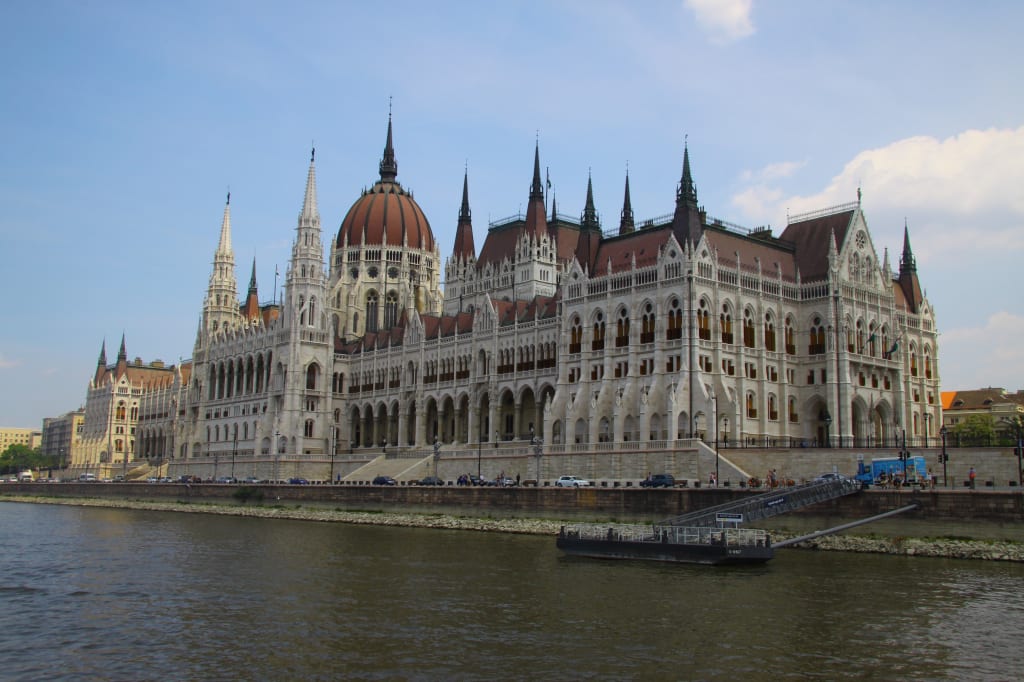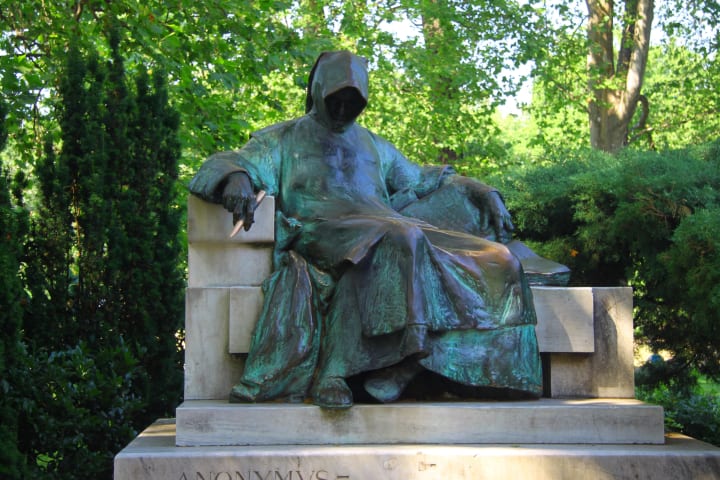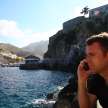Budapest and the Fine Art of Missing Everything
What’s the point of travel if you’re never really there?

“Where are you guys from?”
The young man’s face was pockmarked with acne. His sandy blonde hair was swept back and held in place with a generous amount of some pungent product. On his chest, a bullet dangled from a long silver chain.
“Canada.”
“Oh, Canada? You know who I love who is from Canada? Musician. I give you a clue. He’s been famous since he was a little guy.”
“Um… Justin Bieber?”
The man scowled.
“No, man! Not Justin Bieber! Drake, man! Not Justin Bieber!”
Budapest is a long way from Canada, almost a quarter of the way around the world from our Vancouver home. But somehow, wherever we went in the Hungarian capital, Canada kept coming up.
We took the bus to Budapest.
It was a long ride. The highway roughly followed the path of the Danube, and we were grateful for the air conditioning. When we finally stepped out into the city’s central bus station, the heat hit us like a wall.
Budapest has been around forever, even if the city was only officially formed in the 19th century. Like all of this part of Europe, the city has seen foreign armies come and go, from Romans to Huns to Finno-Ugrians and Habsburgs and Turks. More recently, the Germans were replaced by the Soviets, and it wasn’t until 1989, well within my lifetime, that Hungary stepped out of the shadow of Soviet influence. Maybe that’s why, along with other cities like Warsaw and Prague, it’s always seemed exotic to me. A glimpse into a different way of life, a different world.
And Budapest is different. Different from Bratislava, where we had come from. Completely different from Vienna, where our journey had started. The Austrian Emperor Franz Joseph may have been crowned King of Hungary in the church on the hill that overlooks the city, but it’s a long way from Austria to here, no matter what a map might tell you. And the different fates of the two cities following the dissolution of the Austro-Hungarian Empire offer the chance to meditate on the vicissitudes of history and the ineluctable power of chance.
Not that that’s what we were there for.
Nowadays, Hungary is part of both the EU and the Schengen area, the borderless block of countries that stretches from the border with Romania all the way to Portugal. But Hungary has kept its own currency instead of adopting the Euro, and we laughed as we withdrew 50,000 forints from an ATM.
Compared to the likes of Barcelona or Paris or London, Budapest is shockingly cheap. Especially if you do your best to avoid the restaurants that employ personable young Drake fans to lure you in. But fifty grand doesn’t go as far as you’d think.
The heat didn’t break the whole time we were in Budapest.
On the sidewalk cafés, huge fans blew cool mist over sighing patrons as they ate lunch. The subway stations provided no relief, even if they are utterly charming, with tiled walls and brass-and-wood ticket booths that look unchanged since Franz Joseph still ruled.
The echoing hush of a quiet church was better, and infinitely more appealing than its main attraction — the withered thousand-year-old fist of Hungary’s first king. It was the kind of heat that has patience and cunning. The kind that is happy to wait outdoors, knowing you’ll eventually have to return.
Power clings to high places. Rulers like to see what’s coming. And in the courts of history’s great monarchs, no one is more insecure than a king. Every throne has its back to the wall.
On the high hill that gives the city the Buda part of its name, kings used to live. Now, Buda castle is a tourist attraction, a gorgeous art gallery behind high gleaming gates. And the old fortress of Fisherman’s Bastion clings to the hill too, its sandy arches and colonnades offering views out over the river and the rest of the city.
Like seemingly everything in Budapest, a darker history lurks just below the surface. The hill is carved out by a series of tunnels and chambers that once operated as a prison where Vlad the Impaler was tortured by his former Hungarian allies. For 3000 forints — less than $10 at the time of writing — you can wander these dark passages while horror movie music blares at you from hidden speakers and tourists giggle nervously.
It was cooler on the water.
Numerous tour companies offer boat rides on the Danube, sailing under the city’s bridges that look ancient, even if they were actually reconstructed after the war. It’s the perfect way to get the perfect shot of the Hungarian parliament building, possibly the most beautiful in the world, with its rusty red domes and dozens of needle-like spires.
As we sailed along the winding path of the river, past the nuclear bomb shelter dug into the hill, past the victory statue commemorating the triumph of the Red Army, past the frowning castle, I heard an accent I recognized and a language I know. Canadians.
There’s a sort of unspoken obligation to make conversation with people on a tour group that come from the same country as you. Especially when the country in question is Canada, where we live in fear of being taken for Americans. But the father and his adult daughter on the boat with us that day were no more interested in talking to us than we were in talking to them. Fair enough. If I wanted to meet Canadians, I can do it in Canada.
And while I watched the concrete-colored water peel back to allow the boat to pass, I could hear them discussing some thorny financial issue relating to the company he had started, and she would inherit.
There’s nothing wrong with making money. We’re all forced into it, the duty we pay on the unpredictable experiences of joy this life has to offer. By default, that makes work important, even when the work we do couldn’t be less meaningful.
But broke as we were at the time, while centuries of Hungarian history passed by us on either side at the pace of a rusted old riverboat, I couldn’t help but feel sorry for these two Canadians who traveled across the world without really seeing anything.
I was reminded of something I’ve noticed before about travel; that we carry our own world with us, and slip all too easily back into it no matter what surroundings we find ourselves in. If all you’re thinking about is garage door manufacture in Burlington, Ontario, are you really in Budapest at all?
Vajdahunyad Castle is practically a baby.
Built in 1896 as part of an exhibition, it’s not even a real castle. It was never a fortress of a palace. It was a tourist attraction from the day it opened. But its eye-catching turrets and ivy-covered walls and parklike grounds made the perfect place to wander around while the raw heat slowly drained out of the day. And it wasn’t busy.
There’s something sinister about the statue. The man, cast in bronze that has accrued a patina of green age, sits in his stone chair with his head down, his features obscured by a hood. The statue represents the anonymous chronicler of the early history of Hungary. The tip of the pen he holds in his right hand looks as fresh and shiny as the day it was cast, kept from aging by the constant touch of writers hoping to contract inspiration like a virus.
Of course I touched it. I need all the help I can get. And in some tangential way, I suppose he gave me this.

But maybe I owe more to the man who approached us while I was getting my photo taken with the statue.
“Where are you from?” he asked in heavily accented English.
The classic opening question you get pelted with when you travel. You hear it in Rome as the swindlers try to tie a friendship bracelet around your wrist or get you to sign some meaningless petition while their accomplices pick your pockets.
You hear it in Athens, in Syntagma Square, where the street sellers push a plastic rose into your hand. You hear it anywhere you travel in Europe that has a significant tourist presence, easy pickings for the desperate and the crooked. And you get sick of hearing it.
Especially when you travel on a budget because you can’t afford anything better. When you take sweaty buses to distant places because it’s cheaper than a flight. No one likes being taken for a mark.
“No thanks,” I curtly said, half-turning away from the man who clutched a violin and bow in one hand.
“No, where are you from?” he persisted. There was an unfriendly edge in his voice. There was no one else in sight.
“We’re not interested,” I said, starting to walk away.
“Tell me, where?”
“Canada,” I finally said over my shoulder.
“Canada,” the old man repeated. “People are people in Canada, in Hungary, in Italy, France, USA, everywhere. I am a person, you are a person.”
I know what he meant. Travel is supposed to broaden the mind, and it can do that, but it can also harden the heart. Because when you spend long periods in countries where you’re ignorant of the culture and even the language, you become a target.
And coming from the background I do, my response tends to be curt at best and downright obnoxious at its worst. We are all just people, and even those trying to make a living on the streets in cities that are popular with those of us lucky enough to get to travel the world are still just people.
But I still didn’t give him any money.
Budapest is steeped in history, and every stone of the city reflects it.
The well-preserved subway stations and the creaking trams and the iron shoes welded to the pavement to commemorate a Nazi massacre. Old communist apartment blocks have been turned into nightclubs, and people too young to remember the old regime dance the night away under the open sky of an old courtyard, the building that surrounds them kept from collapse by thick wooden beams.
Because for all its historical importance, this city is no museum. It’s a place where life burns as brightly as it does anywhere else, where people are people, where they play violins and listen to Drake and manufacture garage doors while crowds of lucky tourists shelter from the heat.
And the concrete-colored waters of the Danube roll slowly by, just as they always have, carrying the years on its sluggish back as it empties into the sea.
About the Creator
Ryan Frawley
Towers, Temples, Palaces: Essays From Europe out now!
Novelist, entomologist and cat owner. Ryan Frawley is the author of many articles and stories and one novel, Scar, available from online bookstores everywhere.






Comments
There are no comments for this story
Be the first to respond and start the conversation.